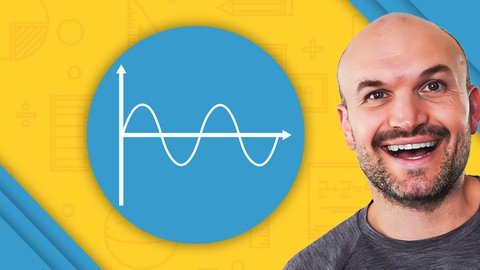Pre-Calculus Simplified
Published 4/2023
MP4 | Video: h264, 1280x720 | Audio: AAC, 44.1 KHz
Language: English | Size: 55.06 GB | Duration: 73h 6m
Learn Pre-Calculus step by step through the exactly same course Mr. McLogan taught inside of the classroom
What you'll learn
Functions including identifying the domain and range, piecewise functions, operations such as composition and finding inverses
Polynomials including, graphing, solving, factoring, multiplicity, synthetic long division, long division and theorems
Rational Functions including vertical, horizontal and oblique asymptotes, finding holes, operations and complex fractions
Trigonometry including right triangles, six trigonometric functions, graphing and and evaluating trigonometric functions
Analytic Trigonometry including solving, simplifying, verifying, and evaluating trigonometric functions using trig identities
Applications of Trigonometry including law of sines/cosines, vectors, parametric and polar equations
Analytic Geometry including graphing and writing the equation of paraboloas, circles, ellipses, and hyperboolas
The limit including evaluating, general, left hand, right hand, and limits at infinity from a graph or equation
Requirements
Algebra 2
Willigness to learn
Geometry
Description
After spending years creating new lesson plans every day I decided to record my lesson so that my student and you could benefit from them, if you are sick, need a refresher, or just want to learn on your own. In this I will break down the sections into a warmup or intro, notes, examples and then homework. You will have plenty of practice problems to try on your own, check your answers or watch me complete. In addition to the assinged work, you will also have online quizzes to test your skills after each section and topic. In addition to online quizzes I also provide the full print out version of test and quizzes I gave to my students in addition to the semester and final exam review and actual tests. While Pre-calculus courses can vary in this pre-calculus course I will cover Functions, Polynomials, Rational Expressions, Trigonometry, Analytic Trigonometry, Applications of Trigonometry, Analytic Geometry and the Limit. You will have everything you will need to know as either a refresher of pre-calculus or to move on to calculus. I hope you enjoy!! Now you have everything you would need to learn or maybe even teach Pre-Calculus. You Ready? Lets do this!
Overview
Section 1: Welcome to Pre-Calculus
Lecture 1 Watch this video first
Section 2: Functions
Lecture 2 1.) Introduction
Lecture 3 1.) What You Need to Know
Lecture 4 1a.) Intro Characteristics of Functions
Lecture 5 1a.) Notes Characteristics of Functions
Lecture 6 1a.) Examples Characteristics of Functions
Lecture 7 1a.) Homework Characteristics of Functions
Lecture 8 1b.) Intro Implied Domain
Lecture 9 1b.) Notes Implied Domain
Lecture 10 1b.) Examples Implied Domain
Lecture 11 1b.) Homework Implied Domain
Lecture 12 1c.) Intro Transformation of Functions
Lecture 13 1c.) Notes Transformations of Functions
Lecture 14 1c.) Examples Transformations of Functions
Lecture 15 1c.) Homework Transformations of Functions
Lecture 16 1d.) Intro Piecewise Functions
Lecture 17 1d.) Notes Piecewise Functions
Lecture 18 1d.) Examples Piecewise Functions
Lecture 19 1d.) Homework Piecewise Functions
Lecture 20 1e.) Intro Operations of Functions
Lecture 21 1e.) Notes Operations of Functions
Lecture 22 1e.) Examples Operations of Functions
Lecture 23 1e.) Homework Operations of Functions
Lecture 24 1f.) Intro Inverse of Functions
Lecture 25 1f.) Notes Inverse of Functions
Lecture 26 1f.) Examples Inverse of Functions
Lecture 27 1f.) Homework Inverse of Functions
Section 3: 2.) Polynomials
Lecture 28 2.) Introduction
Lecture 29 2.) What You Need to Know
Lecture 30 2a.) Intro Characteristics of Polynomials
Lecture 31 2a.) Notes Characteristics of Polynomials
Lecture 32 2a.) Examples Characteristics of Polynomials
Lecture 33 2a.) Homework Characteristics of Polynomials
Lecture 34 2b.) Intro Binomial Expansion
Lecture 35 2b.) Notes Binomial Expansion
Lecture 36 2b.) Examples Binomial Expansion
Lecture 37 2b.) Homework Binomial Expansion
Lecture 38 2c.) Intro Real Rational Zeros of Polynomials
Lecture 39 2c.) Notes Real Rational Zeros of Polynomials
Lecture 40 2c.) Examples Real Rational Zeros of Polynomials
Lecture 41 2c.) Homework Real Rational Zeros of Polynomials
Lecture 42 2d.) Intro Real Irrational Zeros of Polynomials
Lecture 43 2d.) Notes Real Irrational Zeros of Polynomials
Lecture 44 2d.) Examples Real Irrational Zeros of Polynomials
Lecture 45 2d.) Homework Real Irrational Zeros of Polynomials
Lecture 46 2e.) Intro Real Complex Zeros of Polynomials
Lecture 47 2e.) Notes Real Complex Zeros of Polynomials
Lecture 48 2e.) Examples Real Complex Zeros of Polynomials
Lecture 49 2e.) Homework Real Complex Zeros of Polynomials
Lecture 50 2.) Quiz #2 Print
Lecture 51 2.) Chapter Review and Old Tests
Section 4: 3.) Rational Functions
Lecture 52 3.) Introduction
Lecture 53 3.) What You Need to Know
Lecture 54 3a.) Intro Simplify Rational Functions
Lecture 55 3a.) Notes Simplify Rational Functions
Lecture 56 3a.) Examples Simplify Rational Functions
Lecture 57 3a.) Homework Simplify Rational Functions
Lecture 58 3b.) Intro Graph Rational Functions
Lecture 59 3b.) Notes Graph Rational Functions
Lecture 60 3b.) Examples Graph Rational Functions
Lecture 61 3b.) Homework Graph Rational Functions
Lecture 62 3c.) Intro Solve Rational Equations
Lecture 63 3c.) Notes Solve Rational Equations
Lecture 64 3c.) Examples Solve Rational Equations
Lecture 65 3c.) Homework Solve Rational Equations
Lecture 66 3.) Quiz #1 Print
Lecture 67 3) Chapter Review and Old Tests
Section 5: 4.) Trigonometry
Lecture 68 4.) Introduction
Lecture 69 4.) What you need to know
Lecture 70 4a.) Intro Right Triangle Trigonometry
Lecture 71 4a.) Notes Right Triangle Trigonometry
Lecture 72 4a.) Examples Right Triangle Trigonometry
Lecture 73 4a.) Homework Right Triangle Trigonometry
Lecture 74 4b.) Intro Angles in Trigonometry
Lecture 75 4b.) Notes Angles in Trigonometry
Lecture 76 4b.) Examples Angles in Trigonometry
Lecture 77 4b.) Homework Angles in Trigonometry
Lecture 78 4c.) Intro Angles and Constraints
Lecture 79 4c.) Notes Angles and Constraints
Lecture 80 4c.) Examples Angles and Constraints
Lecture 81 4c.) Homework Angles and Constraints
Lecture 82 4d.) Intro The Unit Circle
Lecture 83 4d.) Notes The Unit Circle
Lecture 84 4d.) Examples The Unit Circle
Lecture 85 4d.) Homework The Unit Circle
Lecture 86 4.) Quiz #1
Lecture 87 4e.) Intro Graph Trigonometric Functions
Lecture 88 4e.) Notes Graph Trigonometric Functions
Lecture 89 4e.) Examples Graph Trigonometric Functions
Lecture 90 4e.) Homework Graph Trigonometric Functions
Lecture 91 4f.) Intro Graph Reciprocal Trig Functions
Lecture 92 4f.) Notes Graph Reciprocal Trig Functions
Lecture 93 4f.) Examples Graph Reciprocal Trig Functions
Lecture 94 4f.) Homework Graph Reciprocal Trig Functions
Lecture 95 4g.) Intro Inverses of Trig Functions
Lecture 96 4g.) Notes Inverses of Trig Functions
Lecture 97 4g.) Examples Inverses of Trig Functions
Lecture 98 4g.) Homework Inverses of Trig Functions
Lecture 99 4.) Quiz # 2
Lecture 100 4.) Chapter Review and Test
Section 6: Semester Exam
Lecture 101 Semester Exam Review
Lecture 102 Semester Exam Review FR
Section 7: 5.) Analytic Trigonometry
Lecture 103 5.) Introduction
Lecture 104 5.) What You Need to Know
Lecture 105 5a.) Intro Simplify Identities
Lecture 106 5a.) Notes Simplify Identities
Lecture 107 5a.) Examples Simplify Identities
Lecture 108 5a.) Homework Simplify Identities
Lecture 109 5b.) Intro Verify Trigonometric Identities
Lecture 110 5b.) Notes Verify Trigonometric Identities
Lecture 111 5b.) Examples Verify Trigonometric Identities
Lecture 112 5b.) Homework Verify Trigonometric Identities
Lecture 113 5c.) Intro Solve Trigonometric Equations
Lecture 114 5c.) Notes Solve Trigonometric Equations
Lecture 115 5c.) Examples Solve Trigonometric Equations
Lecture 116 5c.) Homework Solve Trigonometric Equations
Lecture 117 5.) Quiz #1
Lecture 118 5d.) Intro Sum and Difference Formulas
Lecture 119 5d.) Notes Sum and Difference Formulas
Lecture 120 5d.) Examples Sum and Difference Formulas
Lecture 121 5d.) Homework Sum and Difference Formulas
Lecture 122 5e.) Intro Double and Half Angle Formulas
Lecture 123 5e.) Notes Double and Half Angle Formulas
Lecture 124 5e.) Examples Double and Half Angle Formulas
Lecture 125 5e.) Homework Double and Half Angle Formulas
Lecture 126 5.) Quiz #2
Lecture 127 5.) Chapter Review and Test
Section 8: 6.) Applications of Trigonometry
Lecture 128 6.) Introduction
Lecture 129 6.) What You Need to Know
Lecture 130 6a.) Intro Solve Trigonometric Word Problems
Lecture 131 6a.) Notes Solve Trigonometric Word Problems
Lecture 132 6a.) Examples Solve Trigonometric Word Problems
Lecture 133 6a.) Homework Solve Trigonometric Word Problems
Lecture 134 6b.) Intro Law of Sines
Lecture 135 6b.) Notes Law of Sines
Lecture 136 6b.) Examples Law of Sines
Lecture 137 6b.) Homework Law of Sines
Lecture 138 6c.) Intro Law of Cosines
Lecture 139 6c.) Notes Law of Cosines
Lecture 140 6c.) Examples Law of Cosines
Lecture 141 6c.) Homework Law of Cosines
Lecture 142 6.) Quiz #1
Lecture 143 6d.) Intro Vector on a Plane
Lecture 144 6d.) Notes Vector on a Plane
Lecture 145 6d.) Examples Vector on a Plane
Lecture 146 6d.) Homework Vector on a Plane
Lecture 147 6e.) Intro Applications of Vectors
Lecture 148 6e.) Notes Applications of Vectors
Lecture 149 6e.) Examples Applications of Vectors
Lecture 150 6e.) Homework Applications of Vectors
Lecture 151 6f.) Intro Parametric Equations
Lecture 152 6f.) Notes Parametric Equations
Lecture 153 6f.) Examples Parametric Equations
Lecture 154 6f.) Homework Parametric Equations
Lecture 155 6g.) Intro Polar Equation
Lecture 156 6g.) Notes Polar Equation
Lecture 157 6g.) Examples Polar Equation
Lecture 158 6g.) Homework Polar Equation
Lecture 159 6.) Review and Old Tests
Section 9: 7.) Conic Sections
Lecture 160 7.) Introduction
Lecture 161 7.) What You Need to Know
Lecture 162 7a.) Intro Classifying Conic Sections
Lecture 163 7a.) Notes Classifying Conic Sections
Lecture 164 7a.) Examples Classifying Conic Sections
Lecture 165 7a.) Homework Classifying Conic Sections
Lecture 166 7b.) Intro The Parabola
Lecture 167 7b.) Notes The Parabola
Lecture 168 7b.) Examples The Parabola
Lecture 169 7b.) Homework The Parabola
Lecture 170 7c.) Intro The Ellipse
Lecture 171 7c.) Notes The Ellipse
Lecture 172 7c.) Examples The Ellipse
Lecture 173 7c.) Homework The Ellipse
Lecture 174 7d.) Intro The Hyperbola
Lecture 175 7d.) Notes The Hyperbola
Lecture 176 7d.) Examples The Hyperbola
Lecture 177 7d.) Homework The Hyperbola
Lecture 178 7.) Quiz #1
Lecture 179 7.) Review and Tests
Section 10: 8.) The Limit
Lecture 180 8.) Introduction
Lecture 181 8.) What You Need to Know
Lecture 182 8a.) Intro Continuity
Lecture 183 8a.) Notes Continuity
Lecture 184 8a.) Examples Continuity
Lecture 185 8a.) Homework Continuity
Lecture 186 8b.) Intro The General Limit
Lecture 187 8b.) Notes The General Limit
Lecture 188 8b.) Examples The General Limit
Lecture 189 8b.) Homework The General Limit
Lecture 190 8c.) Intro Left and Right Hand Limits
Lecture 191 8c.) Notes Left and Right Hand Limits
Lecture 192 8c.) Examples Left and Right Hand Limits
Lecture 193 8c.) Homework Left and Right Hand Limits
Lecture 194 8d.) Intro Limits at Infinity
Lecture 195 8d.) Notes Limits at Infinity
Lecture 196 8d.) Examples Limits at Infinity
Lecture 197 8d.) Homework Limits at Infinity
Lecture 198 Quiz #1 Printable
Lecture 199 8.) Review and Test
Section 11: Final Exam
Lecture 200 Final Exam Review
Students wanting learn Pre-Calculus on their own,Students that need extra resources while learning Pre-Calculus,Students that need a refresher of Pre-Calculus content
Homepage






























